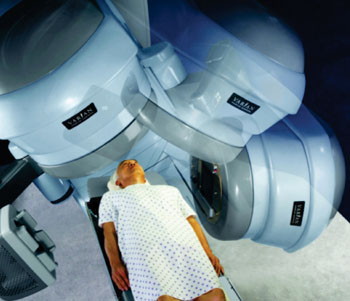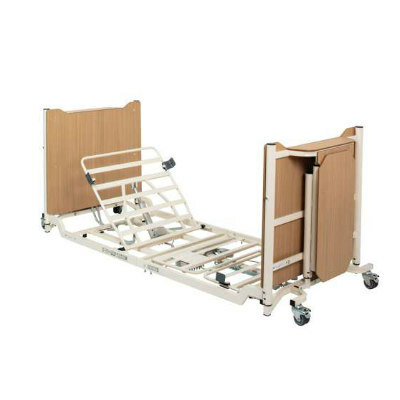Arc Therapy Radiosurgery Faster Than Gamma Knife Treatments
|
By HospiMedica International staff writers Posted on 03 Dec 2014 |

Image: The RapiArc VMAT radiosurgery system (Photo courtesy of Varian Medical Systems).
Volumetric modulated arc therapy (VMAT) radiosurgery treatments can be optimized to treat multiple brain metastases at the same time, according to a new study.
Researchers at the University of Alabama at Birmingham (UAB; USA) identified 20 previously treated Gamma Knife (GK) cases involving a total of 112 lesions, and re-planned them using single fraction VMAT RapidArc radiosurgery. The approach is based on using key RapidArc features, including a high-definition multileaf collimator for ultra-fine beam shaping; a high intensity mode for delivering high doses quickly; and jaw tracking technology for extra shielding of normal tissues.
The UAB approach to RapidArc planning calls for the beam to be delivered using non-coplanar arcs or rotations to maximize the number of treatment angles and enhance precision, as well as optimization criteria that minimizes the amount of low dose fall-off reaching normal brain tissues during treatment. The researchers also developed a predictive model of the 12Gy isodose volume as a function of tumor number and volume.
The results showed that the RapidArc treatment plans for treating multiple tumors are comparable to GK plans in terms of how precisely they can match high doses to the shape of the targeted tumors, as well as minimizing exposure of normal brain tissue outside the treatment area. The researchers also noted that RapidArc treatment for multiple metastases can be completed in 22 minutes, while a comparable GK treatment might take one to five hours, depending on the number of metastases. The study was published in the October 2014 issue of Neurosurgery.
“Brain metastases impact some 170,000 cancer patients in the US each year, and over 70% of those cases involve multiple metastases,” said senior author Prof. John Fiveash, MD, vice chairman for academic programs at UAB. “Using Varian's latest medical linear accelerators and RapidArc technology for VMAT, we can devise treatments that offer the same level of conformity as Gamma Knife technology.”
The RapidArc Radiosurgery system, a product of Varian Medical Systems (Palo Alto, CA, USA), can deliver treatments faster than GK treatments for a variety of reasons, including a dose delivery rate that is at least six times faster, as well as the ability to treat multiple metastases simultaneously, rather than sequentially. The treatments can also be completed using frameless immobilization—without affixing the patient's skull to an immobilization frame—as required for most GK treatments.
Related Links:
University of Alabama at Birmingham
Varian Medical Systems
Researchers at the University of Alabama at Birmingham (UAB; USA) identified 20 previously treated Gamma Knife (GK) cases involving a total of 112 lesions, and re-planned them using single fraction VMAT RapidArc radiosurgery. The approach is based on using key RapidArc features, including a high-definition multileaf collimator for ultra-fine beam shaping; a high intensity mode for delivering high doses quickly; and jaw tracking technology for extra shielding of normal tissues.
The UAB approach to RapidArc planning calls for the beam to be delivered using non-coplanar arcs or rotations to maximize the number of treatment angles and enhance precision, as well as optimization criteria that minimizes the amount of low dose fall-off reaching normal brain tissues during treatment. The researchers also developed a predictive model of the 12Gy isodose volume as a function of tumor number and volume.
The results showed that the RapidArc treatment plans for treating multiple tumors are comparable to GK plans in terms of how precisely they can match high doses to the shape of the targeted tumors, as well as minimizing exposure of normal brain tissue outside the treatment area. The researchers also noted that RapidArc treatment for multiple metastases can be completed in 22 minutes, while a comparable GK treatment might take one to five hours, depending on the number of metastases. The study was published in the October 2014 issue of Neurosurgery.
“Brain metastases impact some 170,000 cancer patients in the US each year, and over 70% of those cases involve multiple metastases,” said senior author Prof. John Fiveash, MD, vice chairman for academic programs at UAB. “Using Varian's latest medical linear accelerators and RapidArc technology for VMAT, we can devise treatments that offer the same level of conformity as Gamma Knife technology.”
The RapidArc Radiosurgery system, a product of Varian Medical Systems (Palo Alto, CA, USA), can deliver treatments faster than GK treatments for a variety of reasons, including a dose delivery rate that is at least six times faster, as well as the ability to treat multiple metastases simultaneously, rather than sequentially. The treatments can also be completed using frameless immobilization—without affixing the patient's skull to an immobilization frame—as required for most GK treatments.
Related Links:
University of Alabama at Birmingham
Varian Medical Systems
Latest Surgical Techniques News
- Miniaturized Implantable Multi-Sensors Device to Monitor Vessels Health
- Tiny Robots Made Out Of Carbon Could Conduct Colonoscopy, Pelvic Exam or Blood Test
- Miniaturized Ultrasonic Scalpel Enables Faster and Safer Robotic-Assisted Surgery
- AI Assisted Reading Tool for Small Bowel Video Capsule Endoscopy Detects More Lesions
- First-Ever Contact Force Pulsed Field Ablation System to Transform Treatment of Ventricular Arrhythmias
- Caterpillar Robot with Built-In Steering System Crawls Easily Through Loops and Bends
- Tiny Wraparound Electronic Implants to Revolutionize Treatment of Spinal Cord Injuries
- Small, Implantable Cardiac Pump to Help Children Awaiting Heart Transplant
- Gastrointestinal Imaging Capsule a Game-Changer in Esophagus Surveillance and Treatment
- World’s Smallest Laser Probe for Brain Procedures Facilitates Ablation of Full Range of Targets
- Artificial Intelligence Broadens Diagnostic Abilities of Conventional Coronary Angiography
- AI-Powered Surgical Visualization Tool Supports Surgeons' Visual Recognition in Real Time
- Cutting-Edge Robotic Bronchial Endoscopic System Provides Prompt Intervention during Emergencies
- Handheld Device for Fluorescence-Guided Surgery a Game Changer for Removal of High-Grade Glioma Brain Tumors
- Porous Gel Sponge Facilitates Rapid Hemostasis and Wound Healing
- Novel Rigid Endoscope System Enables Deep Tissue Imaging During Surgery
Channels
Artificial Intelligence
view channel
AI-Powered Algorithm to Revolutionize Detection of Atrial Fibrillation
Atrial fibrillation (AFib), a condition characterized by an irregular and often rapid heart rate, is linked to increased risks of stroke and heart failure. This is because the irregular heartbeat in AFib... Read more
AI Diagnostic Tool Accurately Detects Valvular Disorders Often Missed by Doctors
Doctors generally use stethoscopes to listen for the characteristic lub-dub sounds made by heart valves opening and closing. They also listen for less prominent sounds that indicate problems with these valves.... Read moreCritical Care
view channel
Powerful AI Risk Assessment Tool Predicts Outcomes in Heart Failure Patients
Heart failure is a serious condition where the heart cannot pump sufficient blood to meet the body's needs, leading to symptoms like fatigue, weakness, and swelling in the legs and feet, and it can ultimately... Read more
Peptide-Based Hydrogels Repair Damaged Organs and Tissues On-The-Spot
Scientists have ingeniously combined biomedical expertise with nature-inspired engineering to develop a jelly-like material that holds significant promise for immediate repairs to a wide variety of damaged... Read more
One-Hour Endoscopic Procedure Could Eliminate Need for Insulin for Type 2 Diabetes
Over 37 million Americans are diagnosed with diabetes, and more than 90% of these cases are Type 2 diabetes. This form of diabetes is most commonly seen in individuals over 45, though an increasing number... Read moreSurgical Techniques
view channel
Miniaturized Implantable Multi-Sensors Device to Monitor Vessels Health
Researchers have embarked on a project to develop a multi-sensing device that can be implanted into blood vessels like peripheral veins or arteries to monitor a range of bodily parameters and overall health status.... Read more
Tiny Robots Made Out Of Carbon Could Conduct Colonoscopy, Pelvic Exam or Blood Test
Researchers at the University of Alberta (Edmonton, AB, Canada) are developing cutting-edge robots so tiny that they are invisible to the naked eye but are capable of traveling through the human body to... Read more
Miniaturized Ultrasonic Scalpel Enables Faster and Safer Robotic-Assisted Surgery
Robot-assisted surgery (RAS) has gained significant popularity in recent years and is now extensively used across various surgical fields such as urology, gynecology, and cardiology. These surgeries, performed... Read morePatient Care
view channelFirst-Of-Its-Kind Portable Germicidal Light Technology Disinfects High-Touch Clinical Surfaces in Seconds
Reducing healthcare-acquired infections (HAIs) remains a pressing issue within global healthcare systems. In the United States alone, 1.7 million patients contract HAIs annually, leading to approximately... Read more
Surgical Capacity Optimization Solution Helps Hospitals Boost OR Utilization
An innovative solution has the capability to transform surgical capacity utilization by targeting the root cause of surgical block time inefficiencies. Fujitsu Limited’s (Tokyo, Japan) Surgical Capacity... Read more
Game-Changing Innovation in Surgical Instrument Sterilization Significantly Improves OR Throughput
A groundbreaking innovation enables hospitals to significantly improve instrument processing time and throughput in operating rooms (ORs) and sterile processing departments. Turbett Surgical, Inc.... Read moreHealth IT
view channel
Machine Learning Model Improves Mortality Risk Prediction for Cardiac Surgery Patients
Machine learning algorithms have been deployed to create predictive models in various medical fields, with some demonstrating improved outcomes compared to their standard-of-care counterparts.... Read more
Strategic Collaboration to Develop and Integrate Generative AI into Healthcare
Top industry experts have underscored the immediate requirement for healthcare systems and hospitals to respond to severe cost and margin pressures. Close to half of U.S. hospitals ended 2022 in the red... Read more
AI-Enabled Operating Rooms Solution Helps Hospitals Maximize Utilization and Unlock Capacity
For healthcare organizations, optimizing operating room (OR) utilization during prime time hours is a complex challenge. Surgeons and clinics face difficulties in finding available slots for booking cases,... Read more
AI Predicts Pancreatic Cancer Three Years before Diagnosis from Patients’ Medical Records
Screening for common cancers like breast, cervix, and prostate cancer relies on relatively simple and highly effective techniques, such as mammograms, Pap smears, and blood tests. These methods have revolutionized... Read morePoint of Care
view channel
Critical Bleeding Management System to Help Hospitals Further Standardize Viscoelastic Testing
Surgical procedures are often accompanied by significant blood loss and the subsequent high likelihood of the need for allogeneic blood transfusions. These transfusions, while critical, are linked to various... Read more
Point of Care HIV Test Enables Early Infection Diagnosis for Infants
Early diagnosis and initiation of treatment are crucial for the survival of infants infected with HIV (human immunodeficiency virus). Without treatment, approximately 50% of infants who acquire HIV during... Read more
Whole Blood Rapid Test Aids Assessment of Concussion at Patient's Bedside
In the United States annually, approximately five million individuals seek emergency department care for traumatic brain injuries (TBIs), yet over half of those suspecting a concussion may never get it checked.... Read more
New Generation Glucose Hospital Meter System Ensures Accurate, Interference-Free and Safe Use
A new generation glucose hospital meter system now comes with several features that make hospital glucose testing easier and more secure while continuing to offer accuracy, freedom from interference, and... Read moreBusiness
view channel
Johnson & Johnson Acquires Cardiovascular Medical Device Company Shockwave Medical
Johnson & Johnson (New Brunswick, N.J., USA) and Shockwave Medical (Santa Clara, CA, USA) have entered into a definitive agreement under which Johnson & Johnson will acquire all of Shockwave’s... Read more














